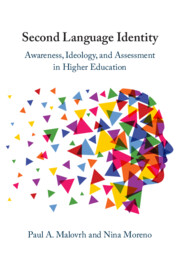Book contents
- Second Language Identity
- Second Language Identity
- Copyright page
- Dedication
- Contents
- Figures
- Tables
- Preface
- Acknowledgments
- 1 On Actors, Architecture, and L2 Advancedness in Higher Education
- Part I Advancedness and the L2 Learner
- Part II Variable Notions of Advancedness
- 5 Language Departments’ Architecture, Ideology, and Mission Regarding L2 Advancedness
- 6 A Quantitative Analysis of Variability in Perceptions of L2 Advancedness among Practitioners, Researchers, and Administrators in Higher Education
- 7 A Qualitative Analysis of Language Professionals’ Descriptions of Their Ideology and Assessment of Advanced L2 Spanish
- Part III Assessment, Identity, and Critical Language Awareness As Markers of Advancedness
- Book part
- Bibliography
- Name Index
- Subject Index
7 - A Qualitative Analysis of Language Professionals’ Descriptions of Their Ideology and Assessment of Advanced L2 Spanish
from Part II - Variable Notions of Advancedness
Published online by Cambridge University Press: 27 July 2023
- Second Language Identity
- Second Language Identity
- Copyright page
- Dedication
- Contents
- Figures
- Tables
- Preface
- Acknowledgments
- 1 On Actors, Architecture, and L2 Advancedness in Higher Education
- Part I Advancedness and the L2 Learner
- Part II Variable Notions of Advancedness
- 5 Language Departments’ Architecture, Ideology, and Mission Regarding L2 Advancedness
- 6 A Quantitative Analysis of Variability in Perceptions of L2 Advancedness among Practitioners, Researchers, and Administrators in Higher Education
- 7 A Qualitative Analysis of Language Professionals’ Descriptions of Their Ideology and Assessment of Advanced L2 Spanish
- Part III Assessment, Identity, and Critical Language Awareness As Markers of Advancedness
- Book part
- Bibliography
- Name Index
- Subject Index
Summary
The present chapter provides qualitative analyses of ideologies and practices toward the assessment of advanced L2 Spanish based on descriptors produced by L2 professionals. As a supplement to the quantitative findings in Chapter 6, we generated more nuanced descriptions of beliefs and practices. We found that advancedness goes beyond the scope of mainstream conceptualizations. In addition, different foci of assessment were not merely limited to constructs of functional communication, linguistic structure, and sophistication, but also extended to L2 speaker identity. We concluded that institutionalized methods of assessing advanced language use should evolve, and that professionals’ values should be free of biases toward specific learner identities. Among such values are the emphasis on language proficiency, on sophisticated language use, and on the L2 speaker’s identity as an autonomous L2 learner developing agency in socio- and intercultural interaction, rather than one that strives to be “nativelike.” We suggest that future research consider the construct of L2 identity as an essential component of advancedness, and that language departments emphasize L2 identity construction.
Keywords
Information
- Type
- Chapter
- Information
- Second Language IdentityAwareness, Ideology, and Assessment in Higher Education, pp. 138 - 168Publisher: Cambridge University PressPrint publication year: 2023
